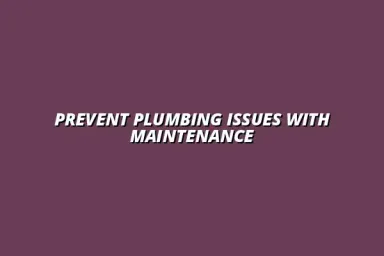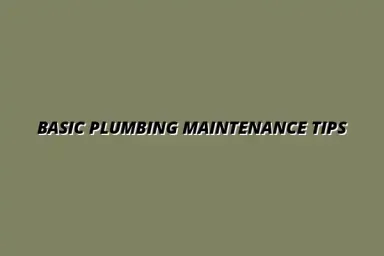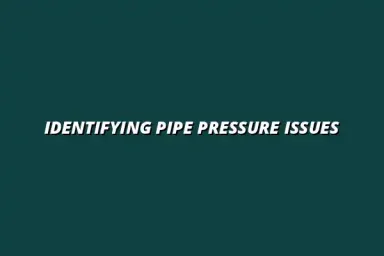Understanding the Importance of DIY Plumbing Maintenance for Homeowners
As a homeowner, understanding the importance of DIY plumbing maintenance can save you a boatload of money and stress. Everything from fixing a leaky faucet to unclogging a drain can be tackled with a bit of knowledge and the right tools. Keeping your plumbing in tip-top shape ensures that your home remains a comfortable and safe place to live!
Plumbing is often an overlooked aspect of home maintenance, yet it plays a crucial role in our daily lives. When issues arise, they can lead to significant damage and costly repairs. By learning how to perform simple plumbing tasks, you can keep your home running smoothly and avoid emergency calls to a plumber. For example, regular maintenance can prevent issues like frozen pipes, which can be a costly problem. Check out this guide on preventing frozen pipes this winter to learn more.
The Role of Plumbing in Home Maintenance
Plumbing connects every part of our homes—from kitchens and bathrooms to laundry rooms. The systems involved are responsible for getting fresh water in and sewage out. Understanding how these systems work helps you appreciate why regular attention is necessary!
With that in mind, here are some key roles plumbing plays in home maintenance:
- Water Supply: Delivers clean water for drinking, cooking, and cleaning.
- Waste Removal: Safely disposes of wastewater and sewage.
- Comfort and Hygiene: Ensures a pleasant living environment with functional bathrooms and kitchens.
Why Regular Plumbing Checks Matter
Regular plumbing checks are essential for preventing small problems from turning into big headaches. Just like you wouldn’t skip oil changes for your car, neglecting your plumbing can lead to costly repairs down the road. A quick inspection can reveal issues that can be fixed before they escalate!
Here are a few reasons why you should prioritize regular plumbing checks:
- Early Detection: Identify leaks and clogs before they cause damage.
- Efficiency: Ensure that your water systems are running smoothly.
- Savings: Reduce the likelihood of expensive repairs with proactive maintenance.
The Cost Benefits of DIY Plumbing Tasks
One of the biggest advantages of tackling DIY plumbing tasks is the amount of money you can save! Hiring a plumber can be expensive, especially for simple jobs that you can handle yourself. Plus, the sense of accomplishment you get from fixing things around the house is priceless! Learning some basic plumbing maintenance can significantly impact your kitchen plumbing. Find helpful tips in this article on plumbing maintenance tips for homeowners.
Consider these cost benefits of DIY plumbing maintenance:
- No Labor Costs: Save money on plumber fees by doing it yourself.
- Simple Repairs: Many plumbing issues are straightforward and can be resolved easily.
- Increased Home Value: Well-maintained plumbing can boost your property’s appeal.
Essential DIY Plumbing Maintenance Tasks to Master
Now that we understand the importance of plumbing maintenance, it’s time to dive into some essential DIY tasks every homeowner should master. By handling these tasks yourself, you’ll be equipped to maintain your home effectively. Plus, you’ll gain confidence in your ability to address plumbing issues as they arise!
Safeguarding Your Home with Smart Plumbing Practices
Taking care of your home's plumbing system is essential for avoiding costly repairs and ensuring everything runs smoothly. One effective way to do this is by creating a plumbing maintenance schedule. This schedule helps you stay organized and reminds you when to check different parts of your plumbing system. Regular bathroom maintenance is also crucial. Learn more about essential bathroom plumbing maintenance tips.
Establishing a routine means you’ll catch issues before they become major problems. It’s like a fitness plan for your plumbing—consistent check-ups keep it in good shape!
Creating a Plumbing Maintenance Schedule
When making a plumbing maintenance schedule, it’s a good idea to break tasks down into monthly, seasonal, and annual activities. This way, you can stay on top of everything without feeling overwhelmed.
- Monthly Tasks: Check water pressure, inspect for leaks, and clean faucet aerators.
- Seasonal Tasks: Flush your water heater and check for pipe insulation. Learn how to easily clean your water heater.
- Annual Tasks: Schedule a professional inspection and replace any aging fixtures.
By keeping these tasks organized, you can easily see what needs to be done throughout the year. It's like having your own plumbing calendar right at your fingertips!
Monthly, Seasonal, and Annual Tasks to Include
Establishing specific tasks for each time frame can help you maintain a healthy plumbing system. Here’s a detailed breakdown:
- Monthly: Look out for leaks under sinks and around toilets.
- Seasonal: Inspect hoses and connections for wear and tear.
- Annual: Review your sump pump and ensure it’s functioning correctly.
These tasks will ensure that you’re consistently monitoring your plumbing system. Regular attention helps prevent small problems from turning into major headaches!
Tracking Maintenance Activities for Better Management
Keeping track of your plumbing maintenance activities is crucial for effective home management. I recommend creating a simple log or using a digital app to record your activities. This log can include:
- Date of maintenance.
- Tasks completed.
- Any noted issues needing attention.
Having a maintenance log not only helps you stay organized but can also be beneficial when you decide to sell your home. Potential buyers love to see a well-maintained property!
Identifying Situations That Require Professional Attention
Even the most diligent DIY enthusiasts sometimes face challenges that are best left to professionals. It's essential to know when to call in the experts, especially for complex plumbing issues that could cause significant damage if mishandled. For example, detecting hidden leaks can be challenging without professional help. Learn how to detect hidden pipe leaks at home and when to call an expert.
By learning to identify these situations, you can save time, money, and stress. Sometimes, knowing your limits means protecting your home even more!
When DIY Isn’t Enough: Recognizing Complex Issues
Some plumbing problems can be quite complicated and require a trained professional. Here are a few situations where calling a plumber is the best choice:
- Major leaks that are hard to locate.
- Issues with the main sewer line.
- Complex installations like new water heaters or pipes.
If you encounter any of these issues, don’t hesitate to reach out for help. It’s better to be safe than sorry when it comes to your plumbing!
Understanding Local Plumbing Codes and Regulations
Every area has its own plumbing codes and regulations that can affect your DIY projects. Familiarizing yourself with these rules is crucial, especially if you're making significant changes to your system. Violating codes can lead to fines or require costly repairs later. For comprehensive home plumbing maintenance, consider consulting a professional plumber. Find a plumber in Kingstanding, Birmingham or your local area for expert advice and services.
Take the time to research your local regulations or consult with a professional. They can offer guidance on what you can and cannot do regarding plumbing modifications in your home.
Encouraging Sustainable Practices in Plumbing Maintenance
As homeowners, there’s a lot we can do to make our plumbing systems more eco-friendly. By adopting sustainable practices, we not only help the environment but also save money in the long run. Regular pipe maintenance is essential to avoid costly repairs and ensure the longevity of your plumbing system. Learn more about essential plumbing maintenance for homes.
Embracing green solutions is becoming increasingly important. It’s an easy way to make a positive impact, and it feels good to know you’re doing your part!
Utilizing Eco-Friendly Products for Home Repairs
When it comes to home repairs, choosing eco-friendly products can make a difference. Here are some options to consider:
- Biodegradable drain cleaners that are gentle on pipes.
- Low-flow toilets and showerheads that conserve water.
- Natural sealants and adhesives that are better for the environment.
These alternatives can help reduce your environmental footprint while keeping your plumbing in top shape. Plus, they often work just as effectively as traditional products!
Harvesting Rainwater and Other Sustainable Plumbing Solutions
Another fantastic way to practice sustainability is by harvesting rainwater. This method can be used for various purposes, such as:
- Irrigating your garden.
- Washing your car.
- Flushing toilets to save freshwater.
By implementing these sustainable practices, you can not only save money on your water bills but also contribute to a healthier planet for future generations!
Recapping Key DIY Plumbing Maintenance Insights
To wrap things up, remember that DIY plumbing maintenance is all about being proactive. By mastering essential tasks and keeping a good maintenance schedule, you can prevent many issues before they start.
Don't forget to utilize sustainable practices and recognize when it's time to call in a professional. With these insights, you’ll be well on your way to becoming a plumbing pro!
Summary of Simple Tasks Homeowners Can Implement
Here are some simple tasks any homeowner can do to maintain their plumbing:
- Regularly check for leaks.
- Clear clogs with simple tools.
- Inspect water pressure and quality.
Implementing these tasks can help keep your plumbing in excellent condition. It’s all about staying vigilant and proactive!
Encouraging a Proactive Approach to Plumbing Care
Staying engaged with your plumbing system is crucial. A proactive approach can save you time, money, and headaches down the road. I encourage you to take charge of your home plumbing maintenance!
By incorporating simple routines into your life, you can become more knowledgeable and confident in handling plumbing issues as they arise.
Resources for Further Learning and Support
If you're eager to learn more about DIY plumbing maintenance, there are plenty of resources available. Consider checking out:
- Online tutorials and videos.
- Local workshops or home improvement classes.
- Books about plumbing basics.
These tools can help you deepen your understanding and make you feel more equipped to tackle any plumbing challenges that come your way!

 Kiran Almasi
Kiran Almasi

